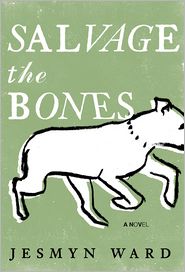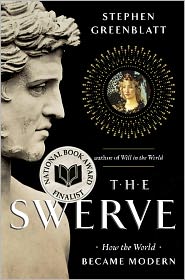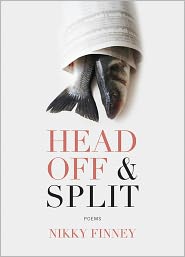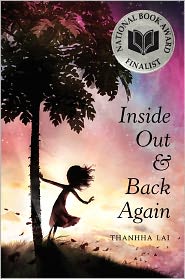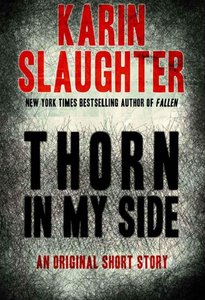Tuesday, December 27, 2011
The Books of 2012
I can only hope that 2012 will prove just as good a year as 2011 has been as far as reading books is concerned. I already have some of the books that will come out in the next few months, some of which I’ve already mentioned in my A Year in Reading post. The list that follows is divided into three parts consisting: A) Of the books that I already have; B) Of those that I expect to get; and, C) Of the ones that I haven’t been able to read last year. So, here we go:
A
Hilda Twongyeirwe – I Dare to say. It comes out on the 1st of February.
Parker Bilal – The Golden Scales. It comes out on the 6th of February.
Lisa Gardner – Catch Me. It comes out on the 7th of February.
David Constantine – The Pillars of Hercules. It comes out on the 6th of March.
Riikka Pulkkinen – True. It comes out on the 20th of March.
Dave Thompson – Hearts of Darkness. It comes out on the 27th of March.
Joseph Wambaugh – Harbor Nocturne. It comes out on the 3rd of April.
Sayed Kashua – Second Person Singular. It comes out on the 3rd of April.
Donna Leon – Beastly Things. It comes out on the 17th of April.
Roddy Doyle – A Greyhound of a Girl. It comes out on the 1st of May.
B
Harlan Coben – Stay Close. It comes out on the 20th of March.
David Baldacci – The Innocent. It comes out on the 17th of April.
John Sandford – Stolen Prey. It comes out on the 14th of May.
Jeffery Deaver – XO. It comes out on the 12th of June.
Kathy Reichs – Bones Are Forever. It comes out on the 21st of August.
Jo Nesbo – Phantom. It comes out on the 4th of September.
C
George R.R. Martin – A Clash of Kings. I’m currently reading it.
Lene Kaaberbol & Agnete Friis – The Boy in the Suitcase. I’m currently reading it.
Roberto Bolaño – Amulet. I’m currently reading it.
Jose Saramago – The Elephant’s Journey
Don DeLillo – The Angel Esmeralda
Lars Kepler – The Hypnotist
Miyuki Miyabe – ICO: Castle in the Mist
Miyuki Miyabe – Brave Story
Yu Hua – Brothers
Hakkan Nesser – The Unlucky Lottery
P.D. James – Death Comes to Pemberley
Michele Halberstadt – Pianist in the Dark
Orhan Pamuk – The White Castle
Taichi Yamada – I Haven’t Dreamed of Flying for a While
Kyung-Soon Shin – Please Look After Mom
Colm Toibin – The Empty Family
Dai Sijie – Once on a Moonless Night
Mikkel Birkegaard – The Library of Shadows
Arnaldur Indridason – Hypothermia
Elif Shafak – The Bastard of Istanbul
Gillian Flynn – Dark Places
Yukio Mishima – The Decay of the Angel
Roddy Doyle – Bullfighting
Yrsa Sigurdardottir – Last Rituals
Alexander Maksik – You Deserve Nothing
Arne Dahl – Misterioso
K.O. Dahl – The Fourth Man
Various Authors – Las Vegas Noir. I’m currently reading it.
Various Authors – Bangkok Noir
Various Authors – Mexico City Noir
Various Authors – Barcelona Noir
Koji Suzuki – Dark Water
Carlos Fuentes – Happy Families
Kjell Eriksson – The Princess of Burundi
Tishani Doshi – The Pleasure Seekers
Liza Marklund – The Bomber
Ake Edwardson – Sun and Shadow
Paul Auster – Timbuktu
John Banville – The Infinities
Arturo Perez-Reverte – The Painter of Battles
Junichiro Tanizaki – Quicksand
Natsume Sōseki – Kusamakura
Natsume Sōseki – Sanshiro
Mari Akasaka – Vibrator
Mitsuyo Kakuta – Woman on the Other Shore
Leonardo Padura – Havana Black
Arthur Spevak – Honor & Entropy
Tomas Eloy Martinez - Purgatory
Of course these are not the only books I’m going to read. Everything depends on the when, the where and the why, or probably I should say, the mood. However, I’d dare state that all of the above will be part of my “have read” list at the end of the year.
P.S. Publication dates refer to the U.S. market
Monday, December 19, 2011
A Year in Reading 2011
One of my big favorites this year
I think I should start off by saying that I borrowed the title for this post from The Millions. And then… What can I say after that? Not much really. I can only state the fact that during this year I’ve read more books than ever before. And that 2011 was a year of new discoveries, during which I’ve fallen “in love” with Scandinavian crime fiction, felt pleasantly surprised by George R.R. Martin’s work and continued my long journey into the world of Japanese fiction; but during it I also enjoyed reading some beautiful stories by European authors. Now here’s a list of the books that I’ve read and reviewed:
David Baldacci – Hell’s Corner
Neil Gaiman – The Graveyard Book
Jeffery Deaver – Edge
Haruki Murakami – Kafka on the Shore
Terry Goodkind – Wizard’s First Rule
David Baldacci – The Sixth Man
Yoko Tawada – Where Europe Begins
Michael Connelly – The Fifth Witness
Hitomi Kanehara – Snakes and Earrings
Emma Donoghue – Room
Ian Rankin – The Complaints
Harlan Coben – Live Wire
Philip Pullman – The Good Man Jesus and the Scoundrel Christ
Jo Nesbo – The Devil’s Star
John Sandford – Buried Prey
Banana Yoshimoto – The Lake
David Baldacci – One Summer
Charlaine Harris – Dead Reckoning
Téa Obreht – The Tiger's Wife
Karin Fossum – Bad Intentions
Lev Grossman – The Magician King
Stephen Kelman – Pigeon English
Janet Evanovich – Smokin’ Seventeen
Sara Blaedel – Call Me Princess
Jussi Adler-Olsen – The Keeper of Lost Causes
Lee Child – Worth Dying For
Camilla Läckberg – The Preacher
Andrey Kurkov – Death and the Penguin
Amanda Kyle Williams – The Stranger You Seek
Evan Munday – The Dead Kid Detective Agency
Wilbur Smith – Those in Peril
Tess Gerritsen – The Silent Girl
Mukoma Wa Ngugi – Nairobi Heat
Sebastian Barry – On Canaan’s Side
Lee Child – Second Son
Jo Nesbo – The Snowman
Tim Riley – Lennon
Andrey Kurkov – Penguin Lost
Stella Duffy – Theodora: Actress, Empress, Whore
Stephen King – Mile 81
Ismet Prcic – Shards
Jose Saramago – Cain
Harlan Coben – Shelter
Jamil Ahmad – The Wandering Falcon
Amos Oz – Scenes from Village Life
Michael Connelly – Suicide Run
Mary Glickman – One More River
Joyce Carol Oates – The Corn Maiden and Other Nightmares
Michael Connelly – Angle of Investigation
Karin Slaughter – Thorn in My Side
Various - No Rest for the Dead
Roberto Bolaño – Antwerp
Alessandro Baricco – Without Blood
Ian Rankin – The Impossible Dead
Michael Connelly – The Drop
Karin Fossum – The Caller
Tess Gerritsen – Freaks
These are the rest of the books that I’ve read this year but have not yet reviewed; either because it was too early to do so or due to the lack of time:
Marilynne Robinson – Gilead
Mako Yoshikawa – One Hundred and One Ways
Toni Morrison – Beloved
Margaret Atwood – Alias Grace
Amy Yamada – Trash
Dennis Lehane – Shutter Island
PD James – The Murder Room
Kobo Abe – The Woman in the Dunes
Colm Toibin – The Heather Blazing
David Baldacci – Deliver Us From Evil
Ogai Mori – The Wild Geese
George Pelecanos – Shoedog
Michael Connelly – The Reversal
Murasaki Shikibu – The Tale of Genji
Joseph Conrad – Heart of Darkness
Mordecai Richler – Cocksure
Kenzaburo Oe – Somersault
Chimamanda Ngozi Adichie – Half of a Yellow Sun
Taichi Yamada – Strangers
Masako Togawa – The Master Key
Minette Walters – The Breaker
Yūko Tsushima – The Shooting Gallery
Yasushi Inoue – The Hunting Gun
Kyoko Mori – Shizuko’s Daughter
Sōseki Natsume – The 210th Day
Paul Auster – The Book of Illusions
Hitomi Kanehara – Autofiction
Akira Yoshimura – Shipwrecks
Raymond Chandler – The Big Sleep
Stephen King – The Dark Tower: The Gunslinger
Richard Castle – Naked Heat
Rick Riordan – The Lost Hero
Edogawa Rampo – Japanese Tales of Mystery & Imagination
George R.R. Martin – A Game of Thrones
Dennis Lehane – Moonlight Mile
Hugh Laurie – The Gun Seller
Sōseki Natsume – I Am a Cat II
Hunter S. Thompson – Fear and Loathing in Las Vegas
Harlan Coben – Live Wire
Ray Bradbury – Fahrenheit 451
Miyuki Miyabe – Crossfire
Jeffery Deaver – Carte Blanche
Haruki Murakami – South of the Border, West of the Sun
Patrick Ness – The Knife of Never Letting Go
Daniel Kehlmann – Me and Kaminski
Bret Easton Ellis – Imperial Bedrooms
Yoko Ogawa – The Housekeeper and the Professor
Esther Freud – Hideous Kinky
Mario Vargas Llosa – Who Killed Palomino Molero?
Neil Gaiman – Stardust
Arturo Perez-Reverte – Purity of Blood
Chinua Achebe – Things Fall Apart
Kobo Abe – The Ark Sakura
Iris Johansen – Quinn
Natsume Sōseki – Kokoro
Andrea Kamilleri – The Track of Sand
Haruki Murakami – Pinball, 1973
Kathy Reichs – Flash and Bones
Shuichi Yoshida – Villain
Richard Castle – Heat Rises
A.D. Miller – Snowdrops
Julian Barnes – The Sense of an Ending
George Pelecanos – The Cut
Tatsuhiko Takimoto – Welcome to the NHK!
Marina Sonkina – Lucia’s Eyes and Other Stories
Yoani Sanchez – Havana Real
Tessa Afshar – Pearl in the Sand
Haruki Murakami – 1Q84
David Baldacci – Zero Day
John Connolly – The Burning Soul
Georges Simenon – The Train
Ninni Holmqvist – The Unit
Kaori Ekuni – Twinkle Twinkle
Kwei Quartey – Children of the Street
Michael Ondaatje – The Cat’s Table
David Baldacci – No Time Left
Kathy Reichs – Seizure
Barack Obama – Of Thee I Sing
Amy Yamada – Bedtime Eyes
Janet Evanovich – Explosive Eighteen
Thanhha Lai – Inside Out & Back Again
David Baldacci – Hell’s Corner
Neil Gaiman – The Graveyard Book
Jeffery Deaver – Edge
Haruki Murakami – Kafka on the Shore
Terry Goodkind – Wizard’s First Rule
David Baldacci – The Sixth Man
Yoko Tawada – Where Europe Begins
Michael Connelly – The Fifth Witness
Hitomi Kanehara – Snakes and Earrings
Emma Donoghue – Room
Ian Rankin – The Complaints
Harlan Coben – Live Wire
Philip Pullman – The Good Man Jesus and the Scoundrel Christ
Jo Nesbo – The Devil’s Star
John Sandford – Buried Prey
Banana Yoshimoto – The Lake
David Baldacci – One Summer
Charlaine Harris – Dead Reckoning
Téa Obreht – The Tiger's Wife
Karin Fossum – Bad Intentions
Lev Grossman – The Magician King
Stephen Kelman – Pigeon English
Janet Evanovich – Smokin’ Seventeen
Sara Blaedel – Call Me Princess
Jussi Adler-Olsen – The Keeper of Lost Causes
Lee Child – Worth Dying For
Camilla Läckberg – The Preacher
Andrey Kurkov – Death and the Penguin
Amanda Kyle Williams – The Stranger You Seek
Evan Munday – The Dead Kid Detective Agency
Wilbur Smith – Those in Peril
Tess Gerritsen – The Silent Girl
Mukoma Wa Ngugi – Nairobi Heat
Sebastian Barry – On Canaan’s Side
Lee Child – Second Son
Jo Nesbo – The Snowman
Tim Riley – Lennon
Andrey Kurkov – Penguin Lost
Stella Duffy – Theodora: Actress, Empress, Whore
Stephen King – Mile 81
Ismet Prcic – Shards
Jose Saramago – Cain
Harlan Coben – Shelter
Jamil Ahmad – The Wandering Falcon
Amos Oz – Scenes from Village Life
Michael Connelly – Suicide Run
Mary Glickman – One More River
Joyce Carol Oates – The Corn Maiden and Other Nightmares
Michael Connelly – Angle of Investigation
Karin Slaughter – Thorn in My Side
Various - No Rest for the Dead
Roberto Bolaño – Antwerp
Alessandro Baricco – Without Blood
Ian Rankin – The Impossible Dead
Michael Connelly – The Drop
Karin Fossum – The Caller
Tess Gerritsen – Freaks
These are the rest of the books that I’ve read this year but have not yet reviewed; either because it was too early to do so or due to the lack of time:
Marilynne Robinson – Gilead
Mako Yoshikawa – One Hundred and One Ways
Toni Morrison – Beloved
Margaret Atwood – Alias Grace
Amy Yamada – Trash
Dennis Lehane – Shutter Island
PD James – The Murder Room
Kobo Abe – The Woman in the Dunes
Colm Toibin – The Heather Blazing
David Baldacci – Deliver Us From Evil
Ogai Mori – The Wild Geese
George Pelecanos – Shoedog
Michael Connelly – The Reversal
Murasaki Shikibu – The Tale of Genji
Joseph Conrad – Heart of Darkness
Mordecai Richler – Cocksure
Kenzaburo Oe – Somersault
Chimamanda Ngozi Adichie – Half of a Yellow Sun
Taichi Yamada – Strangers
Masako Togawa – The Master Key
Minette Walters – The Breaker
Yūko Tsushima – The Shooting Gallery
Yasushi Inoue – The Hunting Gun
Kyoko Mori – Shizuko’s Daughter
Sōseki Natsume – The 210th Day
Paul Auster – The Book of Illusions
Hitomi Kanehara – Autofiction
Akira Yoshimura – Shipwrecks
Raymond Chandler – The Big Sleep
Stephen King – The Dark Tower: The Gunslinger
Richard Castle – Naked Heat
Rick Riordan – The Lost Hero
Edogawa Rampo – Japanese Tales of Mystery & Imagination
George R.R. Martin – A Game of Thrones
Dennis Lehane – Moonlight Mile
Hugh Laurie – The Gun Seller
Sōseki Natsume – I Am a Cat II
Hunter S. Thompson – Fear and Loathing in Las Vegas
Harlan Coben – Live Wire
Ray Bradbury – Fahrenheit 451
Miyuki Miyabe – Crossfire
Jeffery Deaver – Carte Blanche
Haruki Murakami – South of the Border, West of the Sun
Patrick Ness – The Knife of Never Letting Go
Daniel Kehlmann – Me and Kaminski
Bret Easton Ellis – Imperial Bedrooms
Yoko Ogawa – The Housekeeper and the Professor
Esther Freud – Hideous Kinky
Mario Vargas Llosa – Who Killed Palomino Molero?
Neil Gaiman – Stardust
Arturo Perez-Reverte – Purity of Blood
Chinua Achebe – Things Fall Apart
Kobo Abe – The Ark Sakura
Iris Johansen – Quinn
Natsume Sōseki – Kokoro
Andrea Kamilleri – The Track of Sand
Haruki Murakami – Pinball, 1973
Kathy Reichs – Flash and Bones
Shuichi Yoshida – Villain
Richard Castle – Heat Rises
A.D. Miller – Snowdrops
Julian Barnes – The Sense of an Ending
George Pelecanos – The Cut
Tatsuhiko Takimoto – Welcome to the NHK!
Marina Sonkina – Lucia’s Eyes and Other Stories
Yoani Sanchez – Havana Real
Tessa Afshar – Pearl in the Sand
Haruki Murakami – 1Q84
David Baldacci – Zero Day
John Connolly – The Burning Soul
Georges Simenon – The Train
Ninni Holmqvist – The Unit
Kaori Ekuni – Twinkle Twinkle
Kwei Quartey – Children of the Street
Michael Ondaatje – The Cat’s Table
David Baldacci – No Time Left
Kathy Reichs – Seizure
Barack Obama – Of Thee I Sing
Amy Yamada – Bedtime Eyes
Janet Evanovich – Explosive Eighteen
Thanhha Lai – Inside Out & Back Again
Neil Gaiman - Coraline
Hakan Nesser – The Return
Alex Kava – Hotwire
Patricia Cornwell – Red Mist
Paul Theroux – Murder in Mount Holly
Gillian Bradshaw – In Winter’s Shadow.
John Grisham – The Litigators
Yasutaka Tsutsui – The Girl Who Leapt Through Time
Stephen King – The Colorado Kid
Asa Larsson – Until Thy Wrath Be Past
Miranda July – No One Belongs Here More Than You
Sofi Oksanen – Purge
Hisham Matar – Anatomy of a Disappearance
Ryu Murakami – Popular Hits of the Showa Era
Thomas Caplan – The Spy Who Jumped Off the Screen. Out on the 12th of January.
Hakan Nesser – The Return
Alex Kava – Hotwire
Patricia Cornwell – Red Mist
Paul Theroux – Murder in Mount Holly
Gillian Bradshaw – In Winter’s Shadow.
John Grisham – The Litigators
Yasutaka Tsutsui – The Girl Who Leapt Through Time
Stephen King – The Colorado Kid
Asa Larsson – Until Thy Wrath Be Past
Miranda July – No One Belongs Here More Than You
Sofi Oksanen – Purge
Hisham Matar – Anatomy of a Disappearance
Ryu Murakami – Popular Hits of the Showa Era
Thomas Caplan – The Spy Who Jumped Off the Screen. Out on the 12th of January.
Nick Arvin – The Reconstructionist
Vilmos Kondor – Budapest Noir. Out on February the 1st.
David Perry – The Cyclops Conspiracy. Out on February the 1st.
Raymond Khoury – The Devil’s Elixir. Out on the 27th of December.
Val McDermid – The Retribution. Out on the 10th of January.
Philip Pullman – Two Crafty Criminals. Out on the 8th of May.
Niccolo Ammaniti – Me and You. Out at the end of January.
Ernesto Sabato – The Tunnel. Out on the 27th of December.
A.S. Byatt – Ragnarok. Out on February the 1st.
During the past twelve months I’ve also read 30 books in Greek, which brings the grand total to 190, if the math is right. Not bad at all, I’d dare say.
Vilmos Kondor – Budapest Noir. Out on February the 1st.
David Perry – The Cyclops Conspiracy. Out on February the 1st.
Raymond Khoury – The Devil’s Elixir. Out on the 27th of December.
Val McDermid – The Retribution. Out on the 10th of January.
Philip Pullman – Two Crafty Criminals. Out on the 8th of May.
Niccolo Ammaniti – Me and You. Out at the end of January.
Ernesto Sabato – The Tunnel. Out on the 27th of December.
A.S. Byatt – Ragnarok. Out on February the 1st.
During the past twelve months I’ve also read 30 books in Greek, which brings the grand total to 190, if the math is right. Not bad at all, I’d dare say.
Labels:
2011 reading list,
authors,
Book Reviews,
books,
novels,
short fiction,
world literature
Wednesday, November 30, 2011
Book Review: Freaks by Tess Gerritsen

The main protagonists in this short story by Tess Gerritsen, which only came out as an eBook and you can download from here for free, are the usual suspects: detective Jane Rizzoli and -“the queen of the dead”- medical examiner Maura Isles.
The events of this case take place during one of the coldest winters in history in Boston, where the local police discovers the corpse of a young woman in a deserted church. Kimberly Rayner, as is the victim’s name, looks undernourished and seems to have been strangled to death. While Rizzoli and Isles observe the scene of the crime, the most outstanding object of which is an open casket, they soon come to realize that apart from the cops there’s another presence there; that of a scared young man who when spotted runs for his life with Jane in pursuit, who’s bound to get him. Of course, when arrested, he instantly becomes the prime suspect, even though he insists that he’s innocent. The man that goes by the name Lucas Henry says that he truly loved Kimberly, that they were soul mates and that all he ever tried to do was help her out. Truth be told, if someone ever saw the two of them standing next to each other, he would have no choice but believe his words, since they looked almost the same: deathly pale and ghost-like. Besides, according to Lucas their physique had to do with the fact that they were vampires. Not that they were attacking people in order to drink their blood, nothing like that; they just lived on… air, and blood, provided to them by some butcher or from a friend or two who got it from a blood bank.
His story really sounds crazy, outrageous, but the police besides his presence at the scene of the crime, has no evidence whatsoever against him, while Dr. Isles is of the opinion that the two of them were suffering from a diagnosed illness which caused them to have shared delusions.
But if it wasn’t Lucas the one that killed the girl then who was? Well, the events are about to take a dramatic turn, which will bring Jane face to face with an extremely dangerous situation. Thankfully though, her good friend, the doctor, will once again come to save the day, as she will discover who the real perp is, using her usual means: science. The solution to the riddle will prove to be just as strange, as the case itself.
This is a well-written story, which will undoubtedly satisfy the fans of this unique team of investigators.
Labels:
book review,
crime fiction,
ebook,
Freaks,
short fiction,
short story,
summary,
synopsis,
Tess Gerritsen
Thursday, November 24, 2011
Book Review: The Caller by Karin Fossum
Karin Fossum is an author from Norway whom I’ve discovered only recently, so this is just the second of her books that I’ve come to read. The first one was Bad Intentions which I whole-heartily recommend to all crime fiction aficionados.
The events of The Caller, in which the main protagonists are the usual suspects inspectors Sejer and Skarre, take place in a small provincial town in Norway. It all begins when somebody spills blood on a baby girl who sleeps in her pram beneath a tree in the yard, and thus gives the parents the scare of their lives, since at first they think that their kid is bleeding to death.
Sejer is called to investigate the case, which at the beginning seems no more than an ill-humored prank. However at that very same night he receives a postcard with just a few words on it, according to which: Hell begins now. And it does, as during the next few days a series of unfortunate events, sometimes funny but mostly scary, will take place, which will spread a vale of terror over the town: A man will find his sheep dyed orange, a woman will read her obituary in the newspaper, and another one will receive a phone call which will make her rush to the hospital to visit her badly injured in a traffic accident daughter, who’s not there.
As the incidents increase day by day and the people get all the more scared, inspectors Sejer and Skarre do their best to discover who’s behind these actions. However that will not prove so easy because, even though the perp seems to be a psychologically disturbed person, he’s also highly intelligent and able to function well under pressure.
The closer they get to him the better Sejer will come to understand his way of thinking. However as the perp will feel the breath of the law on his back, he will not feel scared. Instead he will decide to move ahead with his plans; plans that will make his past actions look nothing more than child’s play.
Once again the author puts too much weight on the inner world of her heroes; she describes their way of thinking and their troubled psyches, and thus delivers a book that can be read not only as a crime fiction novel but also as a sociological-psychological commentary.
By the same author:
Bad Intentions
The events of The Caller, in which the main protagonists are the usual suspects inspectors Sejer and Skarre, take place in a small provincial town in Norway. It all begins when somebody spills blood on a baby girl who sleeps in her pram beneath a tree in the yard, and thus gives the parents the scare of their lives, since at first they think that their kid is bleeding to death.
Sejer is called to investigate the case, which at the beginning seems no more than an ill-humored prank. However at that very same night he receives a postcard with just a few words on it, according to which: Hell begins now. And it does, as during the next few days a series of unfortunate events, sometimes funny but mostly scary, will take place, which will spread a vale of terror over the town: A man will find his sheep dyed orange, a woman will read her obituary in the newspaper, and another one will receive a phone call which will make her rush to the hospital to visit her badly injured in a traffic accident daughter, who’s not there.
As the incidents increase day by day and the people get all the more scared, inspectors Sejer and Skarre do their best to discover who’s behind these actions. However that will not prove so easy because, even though the perp seems to be a psychologically disturbed person, he’s also highly intelligent and able to function well under pressure.
The closer they get to him the better Sejer will come to understand his way of thinking. However as the perp will feel the breath of the law on his back, he will not feel scared. Instead he will decide to move ahead with his plans; plans that will make his past actions look nothing more than child’s play.
Once again the author puts too much weight on the inner world of her heroes; she describes their way of thinking and their troubled psyches, and thus delivers a book that can be read not only as a crime fiction novel but also as a sociological-psychological commentary.
By the same author:
Bad Intentions
Labels:
book review,
crime fiction,
Karin Fossum,
mystery,
norwegian authors,
novel,
summary,
synopsis,
The Caller
Tuesday, November 22, 2011
The Most Notable Books of Fiction of 2011
The New York Times have printed this year's list of the 100 most notable books in America. Since we are notable for only concerning ourselves with fiction here's a catalog of the titles that belong to this genre:
The Angel Esmeralda by Don DeLillio
The Art of Fielding by Chad Harbach
The Buddha in the Attic by Julie Otsuka
The Cat’s Table by Michael Ondaatje
Chango’s Beads and Two-Tone Shoes by William Kennedy
11/22/63 by Stephen King
The Free World by David Bezmozgis
Ghost Lights by Lydia Millet
Gryphon by Charles Baxter
House of Holes by Nicholson Baker
The Leftovers by Tom Perrotta
The London Train by Tessa Hadley
Lost Memory of Skin by Russell Banks
The Marriage Plot by Jeffrey Eugenides
A Moment in the Sun by John Sayles
My New American Life by Francine Prose
1Q84 by Haruki Murakami
The Pale King by David Foster Wallace
Parallel Stories by Peter Nadas
Say Her Name by Francisco Goldman
The Sense of an Ending by Julian Barnes
Stone Arabia by Dana Spiotta
The Stranger’s Child by Alan Hollinghurst
Swamplandia! by Karen Russell
Ten Thousand Saints by Eleanor Henderson
The Tiger’s Wife by Téa Obreht. Read my review here
The Tragedy of Arthur by Arthur Phillips
Train Dreams by Denis Johnson
Labels:
book list,
catalog,
fiction,
literature,
most notable books 2011,
new york times,
news
Book Review: The Drop by Michael Connelly
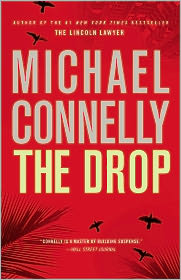
Harry Bosch is back with The Drop, and even though he feels kind of rusty, he’s as good as ever. The good detective is still working in the open-unsolved unit and as we find out right from the start the higher ups have decided to keep him in the Los Angeles police force for four more years, which in real time translates into thirty-nine months. Harry, who does not wish under any circumstances to retire, receives the news as a blessing. It’s not that he wouldn’t be able to live outside the force; it’s just that solving crimes is maybe the only thing he can to do really well.
His current partner is David Chu and the case they are called to investigate is that of one Lily Price, a woman’s who was raped and brutally murdered back in 1989. At the beginning the case looks simple, since now, using the new technologies, they are able to extract the DNA of the perp, from traces of blood that were found on the victim’s neck. The suspect has a history when it comes to crimes of this nature, but -and this is as big a But as you’d ever be able to get- he doesn’t seem likely to have committed this particular crime, since when it happened he was only eight years old. And now the questions are: How did his blood get there? And, who’s the real perp? As Bosch and Chu are about to start looking into it, a new case lands all of a sudden into their hands: the apparent suicide of the son of a councilman, with whom Harry clashed head to head more than once in the past. Given their ugly history he wonders as to whether it would be better if someone else handled the case, but then he learns that his involvement came as a direct request from the said councilman.
So, having no word in the matter, the two partners head for the hotel where the man’s body was found. He’d supposedly jumped from his room’s balcony. This, at least at first, looks a simple case as well. However a few minimal clues that emerge here and there, some details that just don’t fit, as well as some facts that soon come under Harry’s attention, just complicate it. Thus, where he expected to sail through the case he finds himself wandering through a labyrinth made of secret and lies, and not before too long he comes to realize that he can’t really trust anyone, since time and again people betray him.
In the end the only person that he can really lean on, but also truly have faith in, is his daughter Maddie, who’s decided to follow in his footsteps and become a cop. Harry is more proud of her that he could ever imagine himself to be and little by little he starts to train her for the future she chose. The more he trains her though, the more he feels like her ingenuity surpasses his, while her perception just about everything seems to get better and stronger all the time. Thus time and again she doesn’t hesitate to point out to him some things he failed to notice, his small omissions. In the meantime a new woman comes into his life and he feels that something good could happen with her; something good and lasting; but not when things are as complicated as they now are.
As Harry will struggle to solve these cases he’ll have to, willingly or not, take a good look into his life and way of thinking, and maybe, just maybe, put some water in his wine, soften up a little, in order to give the people who worth it their due or simply a second chance.
This is one of the best books Michael Connelly has written with this protagonist in the epicenter of the action. It reminds us of a crime novel and the story of a psyche at the same time. I’m sure the fans will love it, but this also offers the opportunity to the readers who have never met Bosch before to get to know one of the best fictional detectives out there.
His current partner is David Chu and the case they are called to investigate is that of one Lily Price, a woman’s who was raped and brutally murdered back in 1989. At the beginning the case looks simple, since now, using the new technologies, they are able to extract the DNA of the perp, from traces of blood that were found on the victim’s neck. The suspect has a history when it comes to crimes of this nature, but -and this is as big a But as you’d ever be able to get- he doesn’t seem likely to have committed this particular crime, since when it happened he was only eight years old. And now the questions are: How did his blood get there? And, who’s the real perp? As Bosch and Chu are about to start looking into it, a new case lands all of a sudden into their hands: the apparent suicide of the son of a councilman, with whom Harry clashed head to head more than once in the past. Given their ugly history he wonders as to whether it would be better if someone else handled the case, but then he learns that his involvement came as a direct request from the said councilman.
So, having no word in the matter, the two partners head for the hotel where the man’s body was found. He’d supposedly jumped from his room’s balcony. This, at least at first, looks a simple case as well. However a few minimal clues that emerge here and there, some details that just don’t fit, as well as some facts that soon come under Harry’s attention, just complicate it. Thus, where he expected to sail through the case he finds himself wandering through a labyrinth made of secret and lies, and not before too long he comes to realize that he can’t really trust anyone, since time and again people betray him.
In the end the only person that he can really lean on, but also truly have faith in, is his daughter Maddie, who’s decided to follow in his footsteps and become a cop. Harry is more proud of her that he could ever imagine himself to be and little by little he starts to train her for the future she chose. The more he trains her though, the more he feels like her ingenuity surpasses his, while her perception just about everything seems to get better and stronger all the time. Thus time and again she doesn’t hesitate to point out to him some things he failed to notice, his small omissions. In the meantime a new woman comes into his life and he feels that something good could happen with her; something good and lasting; but not when things are as complicated as they now are.
As Harry will struggle to solve these cases he’ll have to, willingly or not, take a good look into his life and way of thinking, and maybe, just maybe, put some water in his wine, soften up a little, in order to give the people who worth it their due or simply a second chance.
This is one of the best books Michael Connelly has written with this protagonist in the epicenter of the action. It reminds us of a crime novel and the story of a psyche at the same time. I’m sure the fans will love it, but this also offers the opportunity to the readers who have never met Bosch before to get to know one of the best fictional detectives out there.
Labels:
book review,
crime fiction,
crime novel,
harry bosch,
michael connelly,
mystery,
summary,
synopsis,
The Drop
Friday, November 18, 2011
Book Review: The Impossible Dead by Ian Rankin
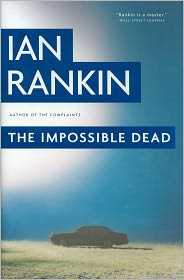
One could say that it is sometimes a blessing to be a British crime fiction author, since the local publishers do not ask their writers to deliver a new book every six months, and thus the standards one has come to expect of them remain high as ever.
Ian Rankin is one of those “lucky” authors and so we are not surprised to receive yet another great novel from him. In The Impossible Dead his main protagonist is inspector Malcolm Fox whom we’ve first met in his previous novel, The Complaints (read my review here), who’s now called to investigate whether three cops of the Kirkcaldy precinct have in any way facilitated the actions of one of their colleagues, who’s been found guilty in a court of law for misconduct. Paul Carter, the policeman in question, was accused of asking favors of a particular kind from three women in exchange for not arresting them for some minor misdemeanors.
From the very first moment that Fox and his partners, Joe Naysmith and Tony Kaye, arrive in town, they can feel a cloud of suspicion and enmity settle all over them. Of course that is hardly surprising since not a single cop likes the members of his team, because of what they do; and that is, in their eyes, work against their own people. One thing that’s kind of strange, or rather surprising though, is that there’s more to this case than what at first meets the eye. For starters, the man who gave Carter in was his uncle Alan, a retired cop. Then there are the connections of this said uncle with the criminal elements of the city. And, then come the facts of the distant past that suddenly spring to life during the investigation; facts that have taken place in Scotland back in 1985, a year of mayhem and relevant chaos, and which are in some strange way connected with what is happening today. Finally are the orders; the orders that come from the higher ups and who demand of Fox and his team to back off this case, as some ghosts are better to remain buried; but which ghosts and why?
Rankin, using a simple investigative case as his vehicle, drives the reader back to the past and talks to him in a rather straightforward way about the widely unknown, or maybe forgotten, history of his country. Through the narration we get to learn about the student unrests of the 80’s, the nationalist movement and the communists of the era, about the armed groups and the revolutions that never came to be. And returning back to the present we find out some things about modern day Scotland, a place where poverty and unemployment are widespread, where alcoholism, drug addiction and crime, as well as corruption rule the day.
The author paints a world that is bleak, on the brink of destruction, but which, thankfully, is not quite there yet. And he also paints a world where hope for a better future is still, if barely, alive. Fox reminds us in one way or another of Rebus, but he is special in his own way. He doesn’t drink, even though his sister is an alcoholic; he likes to be alone, even though he seems to desperately seek the company of a woman; and he does everything he possibly can to help those, who willingly or not make his life difficult. Of course he is not perfect, he has his flaws; but it’s exactly these flaws that make him look so deeply humane.
This is one of the best crime novels of the year. Just read it.
Labels:
book review,
crime fiction,
Ian Rankin,
Malcolm Fox,
mystery,
novel,
summary,
synopsis,
The Impossible Dead
Thursday, November 17, 2011
2011 National Book Award Winners Announced
The 2011 National Book Award winners were announced late last night. The winners in each category are:
Fiction:
Non-fiction:
Poetry:
Young People's Literature:
Fiction:
Non-fiction:
Poetry:
Young People's Literature:
Wednesday, November 16, 2011
Costa Awards Shortlists revealed
The Costa Awards shortlists have been announced last night. Twenty books have been nominated in five different categories. The winner for each category will be announced on the 4th of January and the overall winner, for the book of the year award, will be revealed on the 24th. The nominated books in each category are:
Novel
The Sense of an Ending - Julian Barnes
A Summer of Drowning - John Burnside
Pure - Andrew Miller
My Darling I Wanted to Tell You - Louisa Young
First Novel
City of Bohane - Kevin Barry
The Last Hundred Days - Patrick McGuinness
Tiny Sunbirds Far Away - Christie Watson
Pao - Kerry Young
Biography
Thin Paths: Journeys In and Around an Italian Mountain Village - Julia Blackburn
Henry’s Demons: Living with Schizophrenia - A Father and Son’s Story - Patrick and Henry Cockburn
Now All Roads Lead to France: The Last Years of Edward Thomas - Matthew Hollis
Charles Dickens: A Life - Claire Tomalin
Poetry
The Bees - Carol Ann Duffy
Night - David Harsent
Fiere - Jackie Kay
November - Sean O’Brien
Children's Book
Flip - Martyn Bedford
The Unforgotten Coat - Frank Cottrell Boyce
Small Change for Stuart - Lissa Evans
Blood Red Road - Moira Young
Novel
The Sense of an Ending - Julian Barnes
A Summer of Drowning - John Burnside
Pure - Andrew Miller
My Darling I Wanted to Tell You - Louisa Young
First Novel
City of Bohane - Kevin Barry
The Last Hundred Days - Patrick McGuinness
Tiny Sunbirds Far Away - Christie Watson
Pao - Kerry Young
Biography
Thin Paths: Journeys In and Around an Italian Mountain Village - Julia Blackburn
Henry’s Demons: Living with Schizophrenia - A Father and Son’s Story - Patrick and Henry Cockburn
Now All Roads Lead to France: The Last Years of Edward Thomas - Matthew Hollis
Charles Dickens: A Life - Claire Tomalin
Poetry
The Bees - Carol Ann Duffy
Night - David Harsent
Fiere - Jackie Kay
November - Sean O’Brien
Children's Book
Flip - Martyn Bedford
The Unforgotten Coat - Frank Cottrell Boyce
Small Change for Stuart - Lissa Evans
Blood Red Road - Moira Young
Labels:
biography,
children's books,
costa awards,
first novel,
literary prizes,
nominations,
novel,
poetry,
shortlists
Tuesday, November 15, 2011
Book Review: Without Blood by Alessandro Baricco
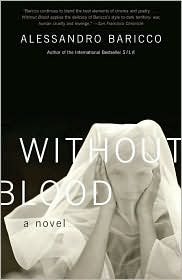
Baricco has a unique gift with words and an ability to enchant the readers with his stories. Every time I read one of his books I’m met with a new surprise, and it’s always a pleasant one.
The main protagonist in Without Blood is Nina. At the beginning of the story we meet her while hiding with her family in an old house in the countryside, in an anonymous country, during an unnamed civil war, which however reminds us of the Spanish.
Nina’s father, Manuel Roca, is not on the winning side, and he seems to have a lot of enemies, so they have to live in hiding to stay alive. But no matter how much they want to escape the past, one day it will catch up with them and the results will be devastating. Their enemies, headed by a man called Salinas, will track them down and a battle will ensue during which Manuel and his son will be killed. Little Nina however who during all this hustle was hidden in the basement will survive. And then…
And then the years swiftly go by, and there comes a time that Nina sets out to take her revenge. She’s afraid of nothing and of no one and she’s determined to spare no effort to reach her goal. And thus yesterday’s hunters become today’s prey.
Of course, as one would expect, in a Baricco story nothing is exactly the way it looks; the author seems to suggest that every coin has two different sides; but of course that doesn’t mean that the one voids the other. At the end of the day what counts the most are the facts; it is them that write the history, it is them that engrave the souls. It is them thus that engraved Nina’s soul, but they were not enough to completely rob her from her humanity, because even though she’s out for revenge she’s not willing to inflict more pain than the pain inflicted on her, while at sometime she reaches a certain point where she can stare with a clear eye on her enemies’ truths. Besides, as we read: “You cannot dream of a better world and think that it will be delivered just because you ask for it.” The world is what it is, the author seems to say, the past cannot change, but it’s nevertheless worth the trouble to fight to make today and tomorrow a little bit better, a bit more humane.
This is a well-written novella about the recurrent mistakes of men and their eternal passions.
The main protagonist in Without Blood is Nina. At the beginning of the story we meet her while hiding with her family in an old house in the countryside, in an anonymous country, during an unnamed civil war, which however reminds us of the Spanish.
Nina’s father, Manuel Roca, is not on the winning side, and he seems to have a lot of enemies, so they have to live in hiding to stay alive. But no matter how much they want to escape the past, one day it will catch up with them and the results will be devastating. Their enemies, headed by a man called Salinas, will track them down and a battle will ensue during which Manuel and his son will be killed. Little Nina however who during all this hustle was hidden in the basement will survive. And then…
And then the years swiftly go by, and there comes a time that Nina sets out to take her revenge. She’s afraid of nothing and of no one and she’s determined to spare no effort to reach her goal. And thus yesterday’s hunters become today’s prey.
Of course, as one would expect, in a Baricco story nothing is exactly the way it looks; the author seems to suggest that every coin has two different sides; but of course that doesn’t mean that the one voids the other. At the end of the day what counts the most are the facts; it is them that write the history, it is them that engrave the souls. It is them thus that engraved Nina’s soul, but they were not enough to completely rob her from her humanity, because even though she’s out for revenge she’s not willing to inflict more pain than the pain inflicted on her, while at sometime she reaches a certain point where she can stare with a clear eye on her enemies’ truths. Besides, as we read: “You cannot dream of a better world and think that it will be delivered just because you ask for it.” The world is what it is, the author seems to say, the past cannot change, but it’s nevertheless worth the trouble to fight to make today and tomorrow a little bit better, a bit more humane.
This is a well-written novella about the recurrent mistakes of men and their eternal passions.
Thursday, November 10, 2011
Book Review: Antwerp by Roberto Bolaño
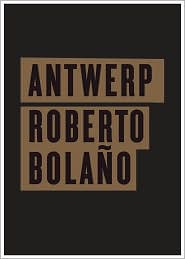
“I wrote this book for the ghosts” says the author, before adding that this “my only novel that doesn’t embarrass me…”
The thing is though that Antwerp is neither a novel, nor a novella; it’s not even a short story collection. If anyone asked me I would say that what we have here is a collection of clippings of life and of random thoughts that somehow manage to meet at one point or another and thus make sense.The author is doing here what he does best; he’s playing. He’s playing with the words and the meanings and a non linear sense of time in order to tell the reader a story in shards; the story of a writer that struggles with words and the story of a hunchback; the story of a red-haired prostitute and the cop that abuses her. And also the story of a day and one more. All that takes place in the city of Barcelona.
If there’s one thing that stands out in this small book, apart from the literary acrobatics, is the way the author drops into the text his cues; the cues that don’t seem to have anything to do with the story but somehow manage to make it better. Here are a few examples: “Forget the gesture that never came”, “Monogamy moves with the same rigidity as the train”, “There are silences made just for us”, “The gun was only a word”, “Loneliness is an aspect of natural human egotism”, “Only the inventors survive”, “Destroy your stray phrases”, “Everything is the projection of a forlorn kid”.
Antwerp is not one of those books that have a beginning, a middle and an ending. The author seems more interested in walking on a tightrope made of words than telling a story. What he brings to light are parts of his inner world: his dreams, his thoughts and even his delusions. And for once again he reminds us of old man Borges, because every now and then he tends to address the reader with a mocking smile, as if implying that he’s not to be taken seriously by anyone. Bolaño seems to be changing costumes and roles all the time and so he sometimes becomes the author, other times the reader and yet other times the protagonist of the book; the god of his own creation.
I’m certain that anyone who’s familiar with his work will enjoy this small gem of a book.
Labels:
Antwerp,
barcelona,
book review,
chilean literature,
novel,
Roberto Bolaño,
summary,
synopsis
Tuesday, November 8, 2011
Book Review: No Rest for the Dead
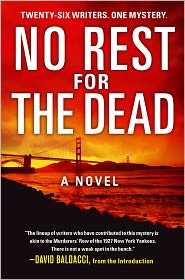
Twenty six authors came together in order to write an action-packed thriller and the result is No Rest for the Dead. The original idea was to create a short story collection, but since this is not an especially commercial genre and the proceeds were meant to go to charity, it has been decided that it’d be better if all of them worked together to write a novel.
If you asked me I wouldn’t say that this book is something special, however it is a well-crafted book that moves at a fine pace and which manages to keep the reader’s interest alive from first page to last. And it is funny, in more than one ways; especially when, let’s say, author number one, decides to make the life of author number two a little bit hard, by driving the story in a completely different direction from the one at hand, and thus make him or her come up with some answers in questions that were not there in the first place. As a result there are many twists and turns and just when one thinks that he’s found the solution to the riddle, something turns up that brings things upside down.But let’s take things from the start, or rather from the end; today. Following the last instructions or, maybe we should say, respecting the last wishes of Rosemary Thomas, a curator of a San Francisco Museum, her closest friends and relatives, as well as some other people who were in one way or another connected with her, meet at her workplace to celebrate the anniversary of her death. Rosemary has been tried, found guilty and executed ten years before for the murder of her husband Christopher. All the evidence at the time was overwhelmingly against her and no one, or almost no one, had any doubts that she committed the crime. Two men though were not so sure that she was guilty. The first one was Hank Zacharius, a journalist, who from the very beginning believed in her innocence and did everything he possibly could to help her, while the second was Jon Nunn, the detective who investigated the case and who was responsible at large for securing her conviction. That case has haunted his life ever since and now, as the anniversary of her death is approaching fast, he’s determined more than ever to put his doubts at rest. The truth will set you free, people say, but Nunn is not that certain that that applies in this case, since it was yesterday’s truths, the ones that he could sense but never dared to investigate that caused his fall. The road to redemption will prove long and painful for a lot of the characters in this unique, in a certain way, novel that travels the reader into the dark corners of some people psyches, but also to some special places in the world of art.
The people who worked on this project are: Jeff Abbott, Lori Armstrong, Sandra Brown, Thomas Cook, Jeffery Deaver, Diana Gabaldon, Tess Gerritsen, Andrew F. Gulli, Peter James, J.A. Jance, Faye Kellerman, Raymond Khoury, John Lescrorat, Jeff Lindsay, Gayle Lynds, Phillip Margolin, Alexander McCall Smith, Michael Palmer, T. Jefferson Parker, Matthew Pearl, Kathy Reichs, Marcus Sakey, Jonathan Sandlofer, Lisa Scottoline, R.L. Stine, Marcia Talley, David Baldacci (introduction), Lamia J. Gulli (editing).
Labels:
book review,
crime fiction,
crime literature,
mystery,
No Rest for the Dead,
novel,
thriller
Saturday, November 5, 2011
Alan Hollinghurst voted as author of the year in Britain
Alan Hollinghurst whose novel The Stranger's Child was omitted from the Man Booker Prize Shortlist has been voted by 750 book trade experts in the UK as writer of the year. His win has been announced in London on Friday night, along with the names of the other winners of the various categories of The Galaxy National Book awards. Here's the list in full:
Waterstone's UK Author of the Year: The Stranger's Child by Alan Hollinghurst (Picador)
Outstanding Achievement award: Jackie Collins
Specsavers popular fiction book of the year: A Tiny Bit Marvellous by Dawn French (Penguin)
More popular non-fiction book of the year: How to be a Woman by Caitlin Moran (Ebury Press)
Crime and thriller of the year: Before I Go to Sleep by S J Watson (Doubleday)
Daily Telegraph biography of the year: Charles Dickens by Claire Tomalin (Viking)
International author of the year: A Visit From the Goon Squad by Jennifer Egan (Corsair)
Food and drink book of the year: The Good Cook by Simon Hopkinson (BBC Books)
WHSmith paperback of the year: Room by Emma Donoghue (Picador) Read my review here
National Book Tokens children's book of the year: A Monster Calls by Patrick Ness (Walker Books)
Audible.co.uk audiobook of the year: My Dear, I Wanted to Tell You by Louisa Young, read by Dan Stevens (HarperAudio)
Galaxy new writer of the year: When God was a Rabbit by Sarah Winman (Headline Review)
Thursday, November 3, 2011
Ebook Review: Thorn in My Side by Karin Slaughter
In whichever way one looks at this, it is indeed a unique or, rather, somewhat strange story.
The protagonists in Thorn in My Side are the conjoined twins Kirk and Wayne. They share between them the most important body parts, however the goddess of luck has decided to bless the one and fail the other. So Kirk is charming, tough and cunning, while Wayne is graceless, shy and weak. Having to share the same body makes them both unhappy, but just the one, the former, can openly express his feelings, and thus he has no problem calling his brother a parasite. The weakling thinks the same thing about Kirk as well, but he just keeps his mouth shut, because he knows his place. However, once there’ll come a night that will change everything and scar their lives forever.
That night is here and is now. The two of them are at a nightclub, where Kirk is dancing with pride and joy, while Wayne just feels bored. If it was up to him he’d be someplace else, but he has no choice since tonight it’s his brother’s turn to do whatever he wants. And what he wants is to make love. Knowing pretty well though that no “normal” woman would ever go to bed with them, they, or rather he, Kirk, has to hire the services of a pro called Mindy.
The events that are about to follow can only be described as tragic and during them all the differences between the two brothers will come to surface. And it is these differences exactly that brightly illuminate the spot on selection of the particular title for this story, since each one of them is indeed a thorn in the side of the other.
The author describes, with not so light touches of humor, the darkness that lurks into the psyches of two men that feel trapped in their common body. It’s like the two of them together combine everything that is really good and awfully bad in people. In this case one plus one doesn’t equal two; it just equals a shared misery.
This is a story that is part-funny part-bleak and so I can’t really say that it will be to everyone’s taste; in my eyes though it is worth reading.
Labels:
book review,
crime fiction,
ebook,
Karin Slaughter,
short story,
summary,
synopsis,
Thorn in My Side,
thriller
Wednesday, November 2, 2011
Man Asian Literary Prize Longlist
The Man Asian Literary Prize Longlist has been announced today. The winner will be announced on the 15th of March. The longlisted novels are:
JAMIL AHMAD (Pakistan) - The Wandering Falcon. Read my review here
TAHMIMA ANAM (Bangladesh) - The Good Muslim
JAHNAVI BARUA (India) - Rebirth
RAHUL BHATTACHARYA (India) - The Sly Company of People Who Care
MAHMOUD DOWLATABADI (Iran) - The Colonel
AMITAV GHOSH (India) - River of Smoke
HARUKI MURAKAMI (Japan) - 1Q84. Book review coming soon
ANURADHA ROY (India) - The Folded Earth
KYUNG-SOOK SHIN (South Korea) - Please Look After Mom. Book review coming soon
TARUN J TEJPAL (India) - The Valley of Masks
YAN LIANKE (China) - Dream of Ding Village
BANANA YOSHIMOTO (Japan) - The Lake. Read my review here
Labels:
bangladesh,
India,
iran,
japan,
longlist 2011,
Man Asian Literary Prize,
pakistan,
south korea
Tuesday, November 1, 2011
Book Review: Angle of Investigation by Michael Connelly
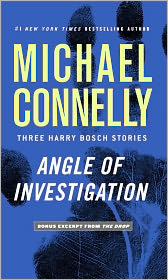
This short story collection that came out only as an eBook is better than Suicide Run, which I reviewed recently, since not only the stories are more interesting but also because it gives the reader a chance to get to know better Connelly’s detective Bosch.
In Christmas Even Bosch and his partner Jerry Edgar are called to investigate a not so common death. The scene of the crime, if ever there was one, is a pawnshop that belongs to a man of Russian origins. According to him his shop has been victimized by a burglar three times in the past and he’s quite certain that the dead man was behind those crimes. How did he get in though and what was it that killed him? Harry will get the answers to these questions with no difficulty at all. But now, and most importantly, he also has to find out who killed him. It’s Christmas Eve. All his colleagues are in a hurry to call it a day and go home, but he knows that he will never get peace of mind if he doesn’t solve the riddle. So he’ll start wandering from one place to the next, arresting people and posing questions until he reaches his goal. At the same time, the accidental recovery of a stolen saxophone will bring back to him memories from the Vietnam War and that’s exactly when one will be able to take a better look into his psyche.
The story in Father’s Day somehow reminds us of an episode of CSI Miami in which something similar has happened. A fifteen month old boy is found dead in his father’s car. The cause of death is heatstroke and now it falls to Bosch and his partner Ignatio Ferras to discover whether it was an accident or rule it a crime. The child was handicapped and in cases like this no one can be certain about anything.
Bosch takes a journey into the past in Angle of Investigation. The year is 1972 and he is just starting his career as a cop in the LAPD, when he and his partner-mentor Ron Eckersly are ordered to visit the house of a woman who, according to her daughter who lives in a different town, has been missing for a few days now. As it turns out the latter had every reason to worry since the two of them will discover the corpse of the woman in her bathtub along with that of her dog. That case has never been solved and now Bosch, who works along with Kiz Rider on the cold case division, is more determined than ever to solve the case and bring the truth to light.
Three nicely crafted tales by one of the best American crime fiction authors.
In Christmas Even Bosch and his partner Jerry Edgar are called to investigate a not so common death. The scene of the crime, if ever there was one, is a pawnshop that belongs to a man of Russian origins. According to him his shop has been victimized by a burglar three times in the past and he’s quite certain that the dead man was behind those crimes. How did he get in though and what was it that killed him? Harry will get the answers to these questions with no difficulty at all. But now, and most importantly, he also has to find out who killed him. It’s Christmas Eve. All his colleagues are in a hurry to call it a day and go home, but he knows that he will never get peace of mind if he doesn’t solve the riddle. So he’ll start wandering from one place to the next, arresting people and posing questions until he reaches his goal. At the same time, the accidental recovery of a stolen saxophone will bring back to him memories from the Vietnam War and that’s exactly when one will be able to take a better look into his psyche.
The story in Father’s Day somehow reminds us of an episode of CSI Miami in which something similar has happened. A fifteen month old boy is found dead in his father’s car. The cause of death is heatstroke and now it falls to Bosch and his partner Ignatio Ferras to discover whether it was an accident or rule it a crime. The child was handicapped and in cases like this no one can be certain about anything.
Bosch takes a journey into the past in Angle of Investigation. The year is 1972 and he is just starting his career as a cop in the LAPD, when he and his partner-mentor Ron Eckersly are ordered to visit the house of a woman who, according to her daughter who lives in a different town, has been missing for a few days now. As it turns out the latter had every reason to worry since the two of them will discover the corpse of the woman in her bathtub along with that of her dog. That case has never been solved and now Bosch, who works along with Kiz Rider on the cold case division, is more determined than ever to solve the case and bring the truth to light.
Three nicely crafted tales by one of the best American crime fiction authors.
Subscribe to:
Posts (Atom)





